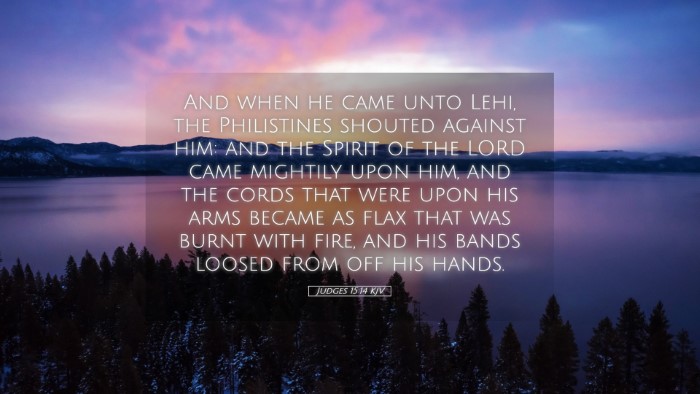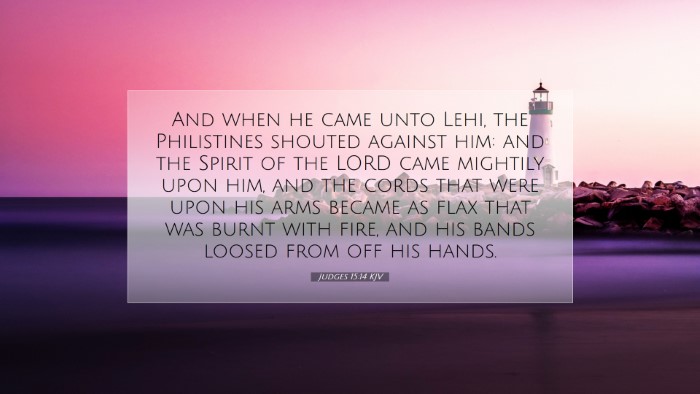Old Testament
Genesis Exodus Leviticus Numbers Deuteronomy Joshua Judges Ruth 1 Samuel 2 Samuel 1 Kings 2 Kings 1 Chronicles 2 Chronicles Ezra Nehemiah Esther Job Psalms Proverbs Ecclesiastes Song of Solomon Isaiah Jeremiah Lamentations Ezekiel Daniel Hosea Joel Amos Obadiah Jonah Micah Nahum Habakkuk Zephaniah Haggai Zechariah MalachiJudges 15:14
Judges 15:14 KJV
And when he came unto Lehi, the Philistines shouted against him: and the Spirit of the LORD came mightily upon him, and the cords that were upon his arms became as flax that was burnt with fire, and his bands loosed from off his hands.
Judges 15:14 Bible Commentary
Bible Commentary on Judges 15:14
Verse: "And when he came unto Lehi, the Philistines shouted against him: and the Spirit of the LORD came mightily upon him, and the cords that were upon his arms became as flax that was burnt with fire, and his bands loosed from off his hands." (Judges 15:14)
Introduction
The story of Samson is one of the most compelling narratives within the Book of Judges. Judges 15:14 captures a pivotal moment in Samson's struggle against the Philistines. This passage exemplifies the dynamics of divine intervention, human conflict, and the empowerment of God’s chosen servant amidst oppression.
Contextual Background
To fully appreciate the significance of Judges 15:14, it is essential to understand the broader context of the verse within the narrative of Samson. The Israelites, particularly the tribe of Dan to which Samson belonged, were subjugated by the Philistines. Samson, chosen by God as a judge and deliverer, constantly wrestled with the forces of oppression, both external and internal. His remarkable physical strength was a symbol of God’s power, but his life also exemplified vulnerability to temptation and moral failure.
Commentary Insights
-
Matthew Henry:
Henry offers a comprehensive view on the miraculous intervention of God during Israel's darkest days. He emphasizes that Samson's experience represents a manifestation of the Spirit of the Lord, highlighting that divine empowerment is crucial during moments of significant battle. According to Henry, the cords binding Samson serve not only as physical restraints but also symbolize the overwhelming struggles faced by the people of Israel. The miraculous release of the cords illustrates God's ability to liberate His servants when they are under duress.
-
Albert Barnes:
Barnes notes the significant phrase, "the Spirit of the LORD came mightily upon him." He explains that this divine empowerment was crucial for the feats that followed, asserting that without this intervention, Samson’s strength would have been ineffective. Woven into Barnes' exposition is the notion that God does not abandon His people; instead, He empowers them to confront their enemies, illustrating a profound theological principle: God's presence transforms the seemingly impossible into the achievable. He reflects on the transformative nature of faith in action, urging readers to trust in divine assistance during their personal Gethsemanes.
-
Adam Clarke:
Clarke provides a detailed analysis of the cultural and situational context, pointing out the historical animosity between the Israelites and the Philistines. He highlights the geographical significance of Lehi, which became synonymous with Samson's struggle and eventual triumph. Clarke also delves into the symbolism of the cords becoming "as flax that was burnt with fire," indicating that the very instruments of restraint can be consumed in the presence of divine glory. This imagery reveals the transient power of human oppression when confronted by the eternal might of God. Clarke’s commentary serves as a reminder that faith, despite overwhelming odds, can lead to divine breakthrough.
Theological Implications
Judges 15:14 offers profound insights into the nature of God's deliverance. The empowerment of Samson by the Spirit carries implications for understanding how God equips and enables His people for service. This empowerment is not merely for personal gain but aligns with the broader redemptive plan of God for His people. The narrative reflects the tension between divine sovereignty and human responsibility, illustrating that while God ordains victory, humans must actively engage in the fight against evil.
Application for Today
Integral to the message of Judges 15:14 is its applicability for contemporary believers. Just as Samson found himself bound by cords, today's faithful may experience various constraints—whether personal sin, societal pressure, or tangible adversity. However, the promise that the Spirit of the Lord can empower and set free remains true. Ministers, students, and scholars must recognize the ongoing relevance of divine empowerment through the Holy Spirit as they navigate the complexities of life and ministry.
Concluding Thoughts
In conclusion, Judges 15:14 not only recounts a historical event in the life of Samson but also serves as a powerful reminder of God's intervention in desperate situations. The commentary by Matthew Henry, Albert Barnes, and Adam Clarke reveals a rich tapestry of themes revolving around divine strength, liberation, and faithful perseverance. For pastors, students, theologians, and Bible scholars, this verse challenges and encourages a deep reliance on God’s spirit, trusting that He can bring about transformation and victory in the face of insurmountable odds.


